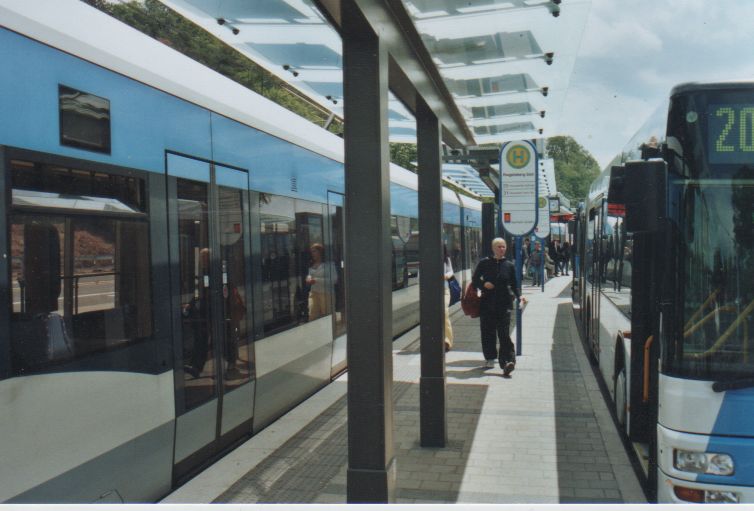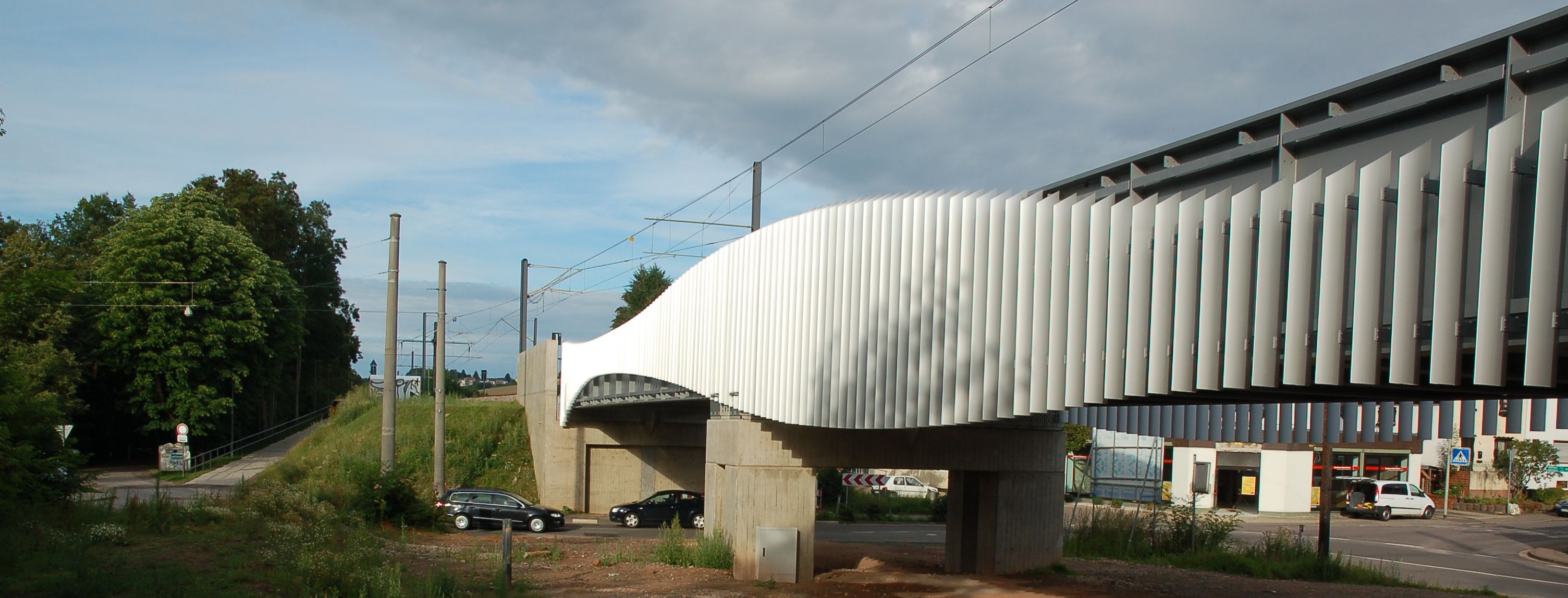Trams in Saarbrücken on:
[Wikipedia]
[Google]
[Amazon]
 The Saarbahn is a regional Stadtbahn operating on the tram-train principle in the German state of the Saarland. It consists of a core line in
The Saarbahn is a regional Stadtbahn operating on the tram-train principle in the German state of the Saarland. It consists of a core line in 






Saarbahn GmbH – official website
{{Coord missing, Saarland Railway lines in the Saarland Tram transport in Germany Light rail in Germany 750 V DC railway electrification 15 kV AC railway electrification Railway lines opened in 1997 1997 establishments in Germany Buildings and structures in Saarbrücken
 The Saarbahn is a regional Stadtbahn operating on the tram-train principle in the German state of the Saarland. It consists of a core line in
The Saarbahn is a regional Stadtbahn operating on the tram-train principle in the German state of the Saarland. It consists of a core line in Saarbrücken
Saarbrücken (; french: link=no, Sarrebruck ; Rhine Franconian: ''Saarbrigge'' ; lb, Saarbrécken ; lat, Saravipons, lit=The Bridge(s) across the Saar river) is the capital and largest city of the state of Saarland, Germany. Saarbrücken is S ...
and Riegelsberg
Riegelsberg () is a municipality in the District of Saarbrücken, Saarland, Germany
Germany,, officially the Federal Republic of Germany, is a country in Central Europe. It is the second most populous country in Europe after Russi ...
operating under tram operating procedures ( BOStrab), connected to two lines that are operated under railway operating procedures ( EBO), the Lebach–Völklingen railway
The Lebach–Völklingen railway is a single-track branch line that originally ran from Lebach to Völklingen in the German state of the Saarland. It is also called the ''Köllertalbahn'' (Koller Valley Railway) because it ran through the Köller ...
to the north and the Saarbrücken–Sarreguemines railway
The Saarbrücken–Sarreguemines railway (also known in German as the Obere Saartalbahn, Upper Saar Valley Railway) is a two-track main line railway, running from Saarbrücken in the German state of the Saarland to Sarreguemines just over the bor ...
in the south. ''Stadtbahn Saar GmbH'' is responsible for the infrastructure of the central section of line, while the outer tracks are operated by the national railway infrastructure companies, DB Netz AG in Germany and Réseau Ferré de France in France. The system is operated by ''Saarbahn GmbH'', and integrated in the (SaarVV).
The route of the new line of the Saarbahn that was opened in central Saarbrücken in 1997 is essentially line 5 of the Saarbrücken tramway, which was closed in 1965. This line ran between Rastpfuhl and Schafbrücke and was the last line of the old metre-gauge network.
, the current network operates on of route, and serves 43 stations.







History
Early planning
The first considerations of building a regional rail network in and around Saarbrücken began in the 1990s. The bus service in central Saarbrücken then ran at such a high density that the vehicles sometimes operated at one-minute intervals. Following the example of the Karlsruhe model, which had operated with great success since 1992, the Saarland began to plan to build a regional Stadtbahn. The core of the concept was the building of an inner-city railway line, while the outer branches would share the existingDeutsche Bahn
The (; abbreviated as DB or DB AG) is the national railway company of Germany. Headquartered in the Bahntower in Berlin, it is a joint-stock company ( AG). The Federal Republic of Germany is its single shareholder.
describes itself as the se ...
railway infrastructure. As early as 1992, it borrowed a light rail vehicle from the Karlsruhe Stadtbahn and ran it on the Fürstenhausen–Gersweiler Bahnhof–Saarbrücken Messebahnhof route on the Rossel Valley Railway (''Rosseltalbahn''), south of the Saar
Saar or SAAR has several meanings:
People Given name
*Saar Boubacar (born 1951), Senegalese professional football player
* Saar Ganor, Israeli archaeologist
*Saar Klein (born 1967), American film editor
Surname
* Ain Saar (born 1968), Est ...
.
Advance operations on the Saarbrücken–Sarreguemines line
Before the opening of the Saarbrücken city centre line, there was a trial operation betweenSaarbrücken Central Station
Saarbrücken (; french: link=no, Sarrebruck ; Rhine Franconian: ''Saarbrigge'' ; lb, Saarbrécken ; lat, Saravipons, lit=The Bridge(s) across the Saar river) is the capital and largest city of the state of Saarland, Germany. Saarbrücken is ...
(''Hauptbahnhof'') and Hanweiler with Saarbahn vehicles. However, as it was still in the Deutsche Bahn timetable, replacing the previously locomotive-hauled trains on this section, it was operated by Deutsche Bahn. This forward operation began on 29 September 1997 and ended on 24 October 1997, the opening day of the new line through the city centre.
Tenth anniversary
On 24 October 2007, the Saarbrücken Stadtbahn celebrated its tenth train anniversary. Since inception more than 100 million passengers had been carried, almost twice as many as originally planned. Thus, it had become a great success as a model for other cities considering the establishment of a light railway.Operations
Commissioning of the central section
The core of the Saarbahn—the new line between Brebach station and Ludwigstraße—was put into operation on 24 October 1997, after just under two and a half years of construction. Since its opening, there has been a system separation point between Römerkastell and Brebach station. This is a 90-metre-long non-energised section of the overhead line, which is traversed using momentum, while the vehicle's electric system automatically switches to the other system. Saarbahn railcars coming from central Saarbrücken change from 750 volts DC to 15,000 volts AC and run via Kleinblittersdorf toSarreguemines
Sarreguemines (; German: ''Saargemünd'' , Lorraine Franconian: ''Saargemìnn'') is a commune in the Moselle department of the Grand Est administrative region in north-eastern France.
It is the seat of an arrondissement and a canton. As of t ...
, Lorraine. The French section from the border station at Hanweiler has been equipped with the German electric system since 1983. The first light rail vehicle that reached Saarguemines was two-system railcar 810 of the Albtal-Verkehrs-Gesellschaft
''Albtal-Verkehrs-Gesellschaft'' ('Alb Valley Transport Company', AVG) is a company owned by the city of Karlsruhe that operates rail and bus services in the Karlsruhe area, southwest Germany.
It is a member of the '' Karlsruher Verkehrsverbu ...
(AVG), which ran there on 11 September 1993 during a presentation ride.
Northern extension
The extension in the northerly direction took place in several stages. It was extended to Cottbuser Platz on 31 July 1999, to Siedlerheim on 13 November 2000, to Riegelsberg Süd on 24 September 2001 and to Walpershofen/Etzenhofen on 26 September 2009. Construction of the Riegelsberg Süd–Walpershofen/Etzenhofen section, required the contribution of additional costs of around €630,000 per year (an amount that was until recently disputed) from the city of Saarbrücken, the municipality of Riegelsberg and indirectly from the Saarland. Clearing work was performed on the former route of the Koller Valley Railway (Lebach–Völklingen railway) through Walpershofen and Dilsburg in January and February 2009, the railway overpass in the center of Walpershofen was renewed in 2009/10 and the reactivation of Heusweiler Markt was largely completed in the summer of 2011. This stretch of track was inaugurated on 30 October 2011. Although another system separation point between BOStrab and EEO was instituted at Walpershofen in 2011, the electrical system does not change there because the electric system for the Saarbahn on the Koller Valley Railway also runs at 750 volts DC. With the exception of a small section between Riegelsberg-Güchenbach and Walpershofen/Etzenhofen over which the Saarbahn runs in an east-west direction along the Russenweg (L 267), which had never been used by a railway, the Saarbahn follows two very different historical railway lines: From Saarbrücken through the Köllertaler Wald (Köller valley forest) and Riegelsberg to Riegelsberg-Güchenbach, Saarbahn follows the course of the historical Riegelsberg tramway: an interurban tram line from St.Johann/Saarbrücken via Riegelsberg to Heusweiler, which was opened in 1907. The line broadly followed today's federal highway 268, which also continues directly from Güchenbach to Heusweiler. The line served the mines in Heusweiler-Dilsburg and Von der Heydt. The tramway was replaced by trolleybuses in 1953 and was replaced in turn by diesel-powered buses in 1964. After the new section between Riegelsberg-Güchenbach and Walpershofen/Etzenhofen, the Saarbahn reaches, at the Walpershofen/Etzenhofen stop, the line of the former Koller Valley Railway, over which it continues north through Walpershofen to its temporary terminus at Heusweiler Markt.Extension to Lebach
A extension of the current line, from the current northern terminus, Heusweiler Markt, north to Lebach-Jabach opened for service on 5 October 2014. This extension will expand the Saarbahn line to cover a total of of route.Operational concept
Currently the cross-city route is operated as line S1 between Heusweiler Markt and Sarreguemines, with services every 7.5 minutes during the day on the core section between Siedlerheim and Brebach station. Originally, a five-minute interval service was planned for the central area, but this was rejected because it would have led to operational problems. On the sections using rail tracks between Brebach and Kleinblittersdorf and between Heusweiler Markt and Siedlerheim there is a 15-minute interval service and on the Kleinblittersdorf–Sarreguemines section services operate every 30 minutes only in the morning and every 60 minutes at other times. In the off peak hour, services operate at 15-minute intervals in the central section, every 30 minutes to Kleinblittersdorf or Siedlerheim and every 60 minutes to Sarreguemines. In the morning peak for professional and school transport and in the afternoon peak, coupled vehicles are used, otherwise single sets are operated. The Saarbahn carries approximately 40,000 passengers daily.Rolling stock
Currently there are 28 Flexity Link tram-trains in use, which were manufactured by Bombardier in Vienna and Bruges. Six sets were temporarily loaned to Kassel, where they operated trial runs for RegioTram Kassel. From the timetable change in December 2009, three tram-trains were lent to the Stadtbahn Karlsruhe for use on line S9.Future service
A line is proposed towards Schafbrücke. Another proposal would include an extension via Burbach toVölklingen station
Völklingen station is the main railway station in the city of Völklingen in the German state of Saarland. It is now only served by passenger trains on the Saar Railway, Saar line (german: Saarstrecke) between Trier Central Station, Trier and Saar ...
, but this plan has been put on hold, as the effects of mining have to be remedied first. Other plans include an extension to the University, to Rotenbühl, to Alt-Saarbrücken, to Forbach and to Eschberg. , no work has been carried out on any of these proposals.
References
External links
Saarbahn GmbH – official website
{{Coord missing, Saarland Railway lines in the Saarland Tram transport in Germany Light rail in Germany 750 V DC railway electrification 15 kV AC railway electrification Railway lines opened in 1997 1997 establishments in Germany Buildings and structures in Saarbrücken